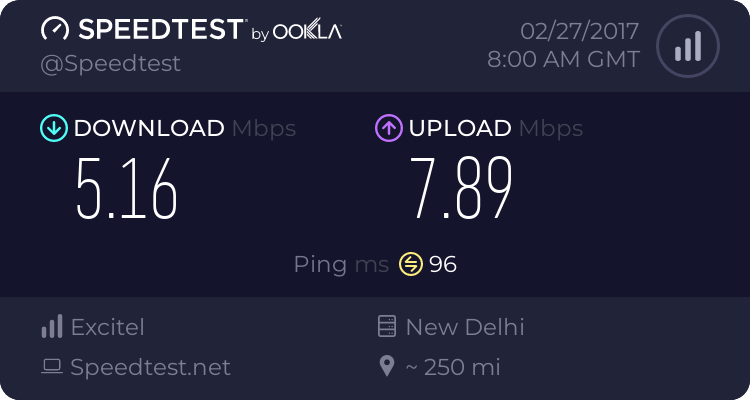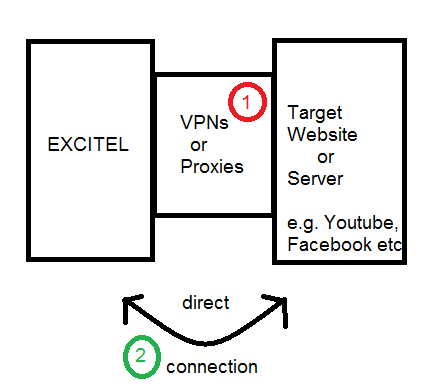Yes
In September they told me that your area is on our expansion list and we will cover your area by december.
In December they told me they will be here by end of jan or early feb.
Now they are saying you can leave your details for Nth time and they will get back to me when they are here but no timeframe was provided but it was in their expansion list.
So is there any definite timeframe ?
In situations such as this, it is usually not easy to provide a definite time period to the end user. Why, you might wonder? Well, if we think rationally, we'll find the answer. Sometimes the local partner (LCO) in your locality might not be interested/willing in cooperating with us. In other situations, the LCO might be cooperative, but there might be some physical interference or hindrance in the area which may be acting as a deterrent. There are simply too many variables in the equation, which are highlighted and discovered when someone thinks about the entire situation in detail.
@Excitel thanks for the replies. Some more queries, more out of curiosity:
1. Why only upto 80 mbps speeds (30+50) and not a good amount more like, say, 100 mbps (or 100+100) since you have fiber backbone and excellent peering in place apparently? Any chance of providing "gigabit" speeds in (near) future to end users?
This has been explained previously, in a reply to
@r19. We can increase the speed, but we also want to ensure that the customer is able to receive the amount of speeds that they have been promised. Therefore, we also need to keep a tab on the LCO networks to check if they have been upgraded or not; so as to be able to handle higher speeds and larger amounts of bandwidth. Otherwise, we'll have customers complaining about not receiving the offered speeds.
2. What is the end-user "CPE" (customer premises equipment) - is it DOCSIS cable modem? If so, what version? I guess the newer 3.0 and 3.1 would allow you to provide higher speeds? Is it dictated by your "LCO" partners or do you have them use latest equipment?
No CPEs are offered from our end. The customer is expected to use their own router. However, most of our local partners (LCOs) offer routers at competitive prices. This interaction is entirely between the customer and the LCO and as such, such transactions are beyond the service arrangement with Excitel.
3. From your website it seems you are using "Extreme Peering" solution (among others) for internet bandwidth savings (and speedup) for some HTTP/P2P content - can you (in general) mention how you go about peering with major folks like Microsoft, Google, Apple etc? Do they provide solutions to ISPs such as yourself or do you perhaps peer in that "Mumbai Convergence Hub" thingy, something like that?
Also, do you have any "contention ratio" that you can or cannot talk about?
Yes, we do have direct peering/caching relations with content vendors - Google, Microsoft, Akamai, Limelight Networks to name a few. All of those are large content providers, currently present in India, but more of them are underway, and, Excitel will be on their launch partner list. We peer with some of the content providers over Extreme IX exchange fabric. We, as Excitel, support developing the carrier-neutral way of inter-ISP traffic exchange in order to bolster the local traffic in India.
As far as your question regarding contention ratios is concerned, we see it in a different way altogether. Rather than defining a rigid limit and transferring the burden onto the customers and choking them in terms of the bandwidth that they use, we analyze the performance of our nodes and the network and as mentioned previously, we DO NOT allow bandwidth to become a bottleneck at any cost. As soon as we notice bandwidth usage on a particular node reaching a safe threshold, we upgrade it, instead of restricting and limiting our users.
We have a clear and unique approach regarding our business model. This is something of paramount importance and we would like customers to know about it. For example, imagine an airline company preventing people from flying more and instead, forcing people to fly less often. That's just going to be suicidal as well as totally counter-productive.
Moreover, our integrity regarding this vision should be out of question. If we wanted to save on bandwidth, we would have never opposed FUPs and we would have never increased speeds FIVE times (yes, 5x !). We initially started out with an entry level package of just 4 Mbps. From that, it was increased to 5 Mbps -> 10 Mbps -> and now it is 20 Mbps. That's a 5x increase in speed in an year.
The way I see it, if that's not proof that we're
NOT involved in the common game of limiting the bandwidth of customers, which is followed by other ISPs, then I'm not sure what else could prove it.

 I guess you wanted to ask about timeframe of availability to your place, right?
I guess you wanted to ask about timeframe of availability to your place, right? I guess you wanted to ask about timeframe of availability to your place, right?
I guess you wanted to ask about timeframe of availability to your place, right?





